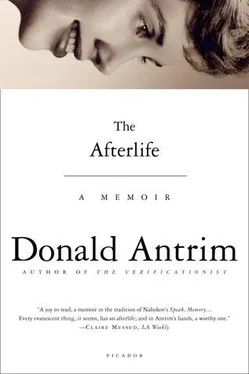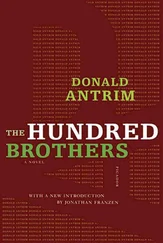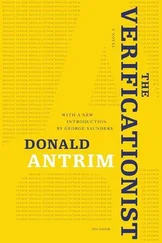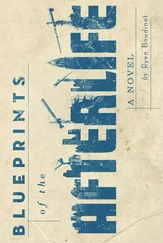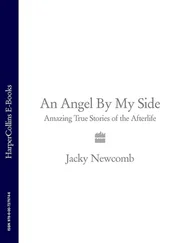We stood and looked at the house. Then we walked down the street to a local restaurant, a fish house. After dinner, we walked past the little house again, got in the car, and drove south. The ocean was to the left. The sun had almost set. We passed a few hotels, then a long stretch of deserted beach. I stopped the car, got out, and walked across the sand. I left my mother in the car by the roadside. The surf was high, as I remember. I took off my shirt, rolled up my pants, and waded in. After my swim I dried off as well as I could, got back in the driver’s seat, and drove through the night.
But where was I? North Carolina? Georgia? Florida? New York? Or back in the house on Lewis Mountain Road in Charlottesville? Or the farmhouse we rented in 1968, after we left Lewis Mountain Road?
The farm’s grounds were surrounded by fields full of cows, and the front yard rolled downhill to a rocky creek. Out back, at the top of a hill, was a white barn filled with hay bales. If you walked up the drive past the barn, then down the other side of the hill, you came to a pond. On the pond’s far bank, beneath overhanging branches, stood the remains of a mill. The pond was brackish and not good for swimming. One afternoon, I watched a gang of boys from a family squatting in the ruins of an old house across the road march in a line up our driveway. There were five or six of them. They carried fishing poles made of sticks. I followed the line of boys, stopping to watch them from behind a fence at the top of the hill near the barn. They were gathered on the pond’s small, rotting dock. In a short time, they hauled in three or four dozen perch. A boy would bait his hook with kernels of canned yellow corn, drop his line, and immediately bring up a fish, which he would lower, flopping on the hook, to the planks of the dock. Another boy, an older brother, would stomp on the fish’s head. The dock was stained with blood, and the sun was setting behind the mountains, and I was twelve years old, and it occurred to me that God was feeding these children, but that He didn’t have to feed me, because my family could buy food. We had clothes, books, and a fire in the fireplace. Every night during the cold months I collected wood for our fire from the woodpile behind the garage.
One autumn night when my father was away on a trip, I went out back for logs and boards, and found a dying bird. I called to my mother, who came out and stood in her nightgown in the cold. The bird’s wings were broken, and its eyes looked terrified. Should I kill it? We owned a rifle, and I proposed to my mother that I might shoot the dying bird. I’d already shot and killed, on another chilly day, a snake that I’d found crossing the front yard. There’d been no reason to kill this snake, but I’d done it anyway, using a BB gun. I’d told myself that the snake was dangerous, and I’d chased it around trees and boxwood bushes and the elevated stepping-stone left from the days when Fiddler’s Green’s inhabitants kept horses. Later that night, the minister of the Episcopal church in Greenwood, a family friend, stopped by for a visit, and, when he got out of his car, I ran to him, crying, “Look! Look!” and he lowered his head and peered down at the snake’s body coiled inside a paper bag, and, as he looked, my pride turned to shame.
Should I now destroy the injured bird? Here was a chance to redeem myself, to kill humanely, in the spirit in which a farmer might, not pointlessly but with compassion. It was an opportunity to be a man in my mother’s eyes. She gave me permission to get the rifle from the upstairs closet. I made sure the rifle was loaded, then walked back down the stairs, through the kitchen, past the giant old Southern Coop freezer on the back porch, and out to the yard, where I shot the bird, I guess. I don’t remember shooting it. Maybe I waited in the dark for the bird to pass away on its own. Or maybe I never got the gun at all. Maybe my mother and I found a cardboard box and, using a folded towel as a cushion, made a bed for the bird, a bed like those we made for our cats to lie on when they gave birth to litters. Did my mother and I carry the bird inside the house full of cats and kittens? Or maybe the bird was gone when I returned to where it had lain on the ground. Had it hobbled away to die? I remember my mother’s face. She looked at me as if she understood that I was trying to understand something. She was willing to see me kill the bird. But did I? And if I did, was she standing beside me when I pulled the trigger?
In 1970, my father left the University of Virginia for a job in Miami. We packed up the farm and headed back to Florida. I was twelve, going on thirteen, and Terry was eleven, going on twelve, and the shift from old Virginia to new Miami was, for the two of us, even at our ages, especially at our ages, unsettling. What was this flat, hot, paved-over place, this place made, as it looked to me upon first arriving in the early 1970s, entirely of one-story houses, crowded freeways, and shopping centers?
In Miami, all our houses were different and the same. Two came with swimming pools. One was noisy from a nearby road, and another was surrounded by trees and bushes — that was the Bauhaus-style house — and another had a cathedral ceiling. These latter two were next door to each other, their properties joined by a path leading through the brambles and vines. When the lease on the Bauhaus-style house was up, we sorted the pots and the pans, rolled the rugs and folded the linens, boxed my mother’s fabrics and her sewing machines, my father’s library. Like four refugees ducking beneath branches and stepping over roots, we carried the lot, one armload per trip, from the old place to the new.
But what about the man with the gun? He sat down in the living room in Charlottesville, placed the gun, in its holster, on the coffee table around which he and my parents were gathered, and, in a steady voice, began to speak. He was a goodlooking man, I remember, a popular teacher and something of a power in the English department. His voice was deep. He had come to calm my mother and father. The gun, I should say, was there to calm them. The man did not know, and my parents did not know, that I was watching from the dark landing at the top of the stairs.
My sister watched with me. Didn’t she? We crouched together on the landing. And did she follow me down the stairs, across the front hallway, and through the open doorway to the living room? I remember hearing the man tell my parents that they could annihilate each other; though, if this was their choice, one or the other of them might as well pick up the gun — there it was in plain view on the table, next to their drinks — and complete their work of fighting to the death. I came down the stairs in my blue pajamas and stood among the adults. I can still hear, in my memory of that night, her voice, and I hear my father’s; I hear them speaking together:
“Don, go back to bed. It’s past your bedtime. Everything’s all right. Run to bed, Don. Off you go.”
Did I get a kiss goodnight? I retreated to my room and lay awake, trembling. Would she kill him? Would he kill her? If the killing took place after the man with the gun had gone home, how would it be done? With a knife taken from a drawer? Where would the killing take place? In the kitchen? In their bedroom? Would there be blood? Would there be screaming, then silence? And would silence feel like relief? Would she go to jail for murder? Would he go to jail for murder? Could I be called to testify in a court of law? How would I testify? Who would be guilty? Who would be innocent? Would my sister and I tell the same story? What story would we tell? Would I tell the truth? What might the truth look like? Would I know the difference between right and wrong? Would someone come and take my mother away? Would someone take my father away? Would my sister and I become orphans? Would we be alone forever after?
Читать дальше
